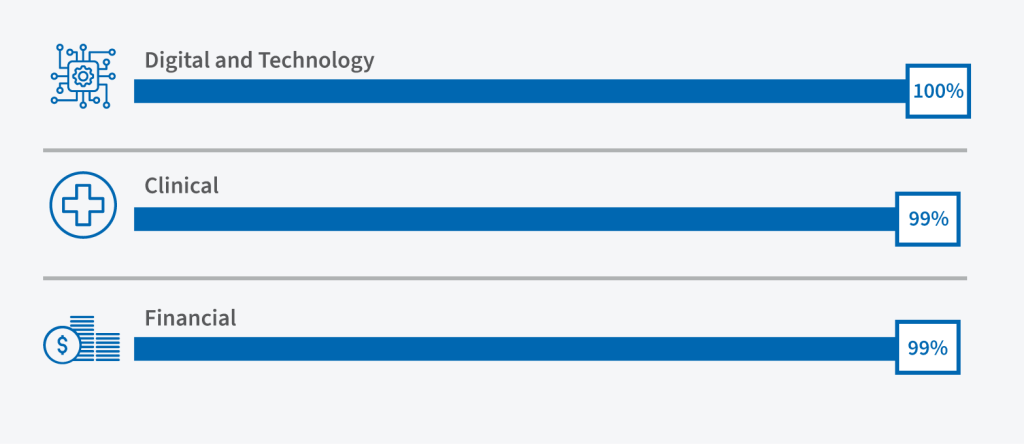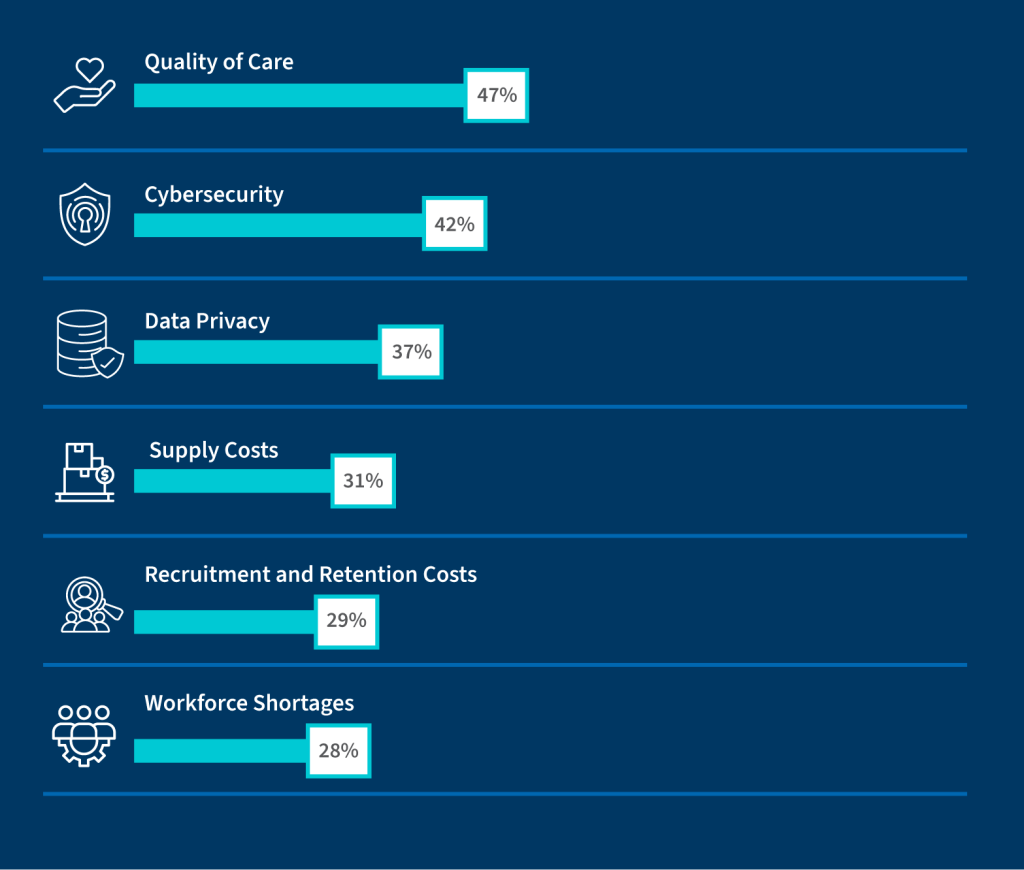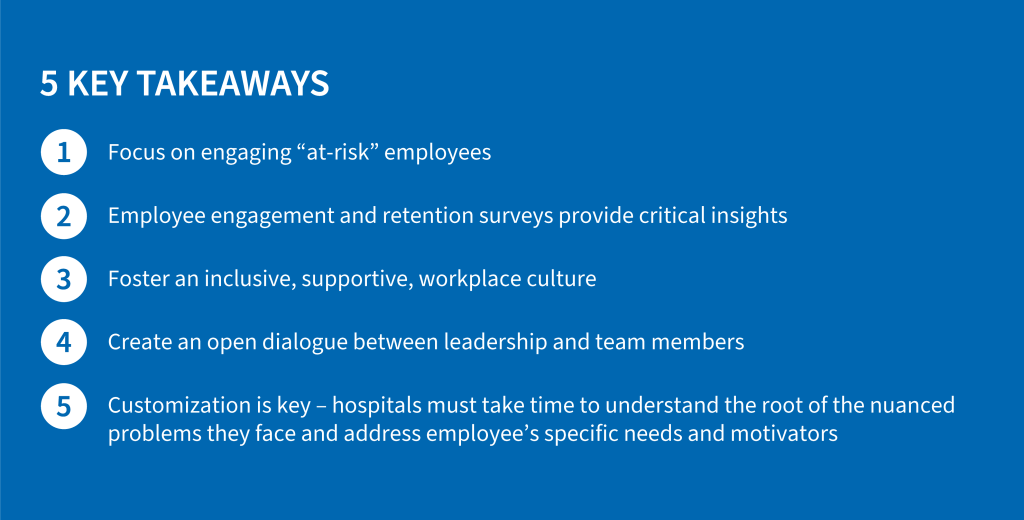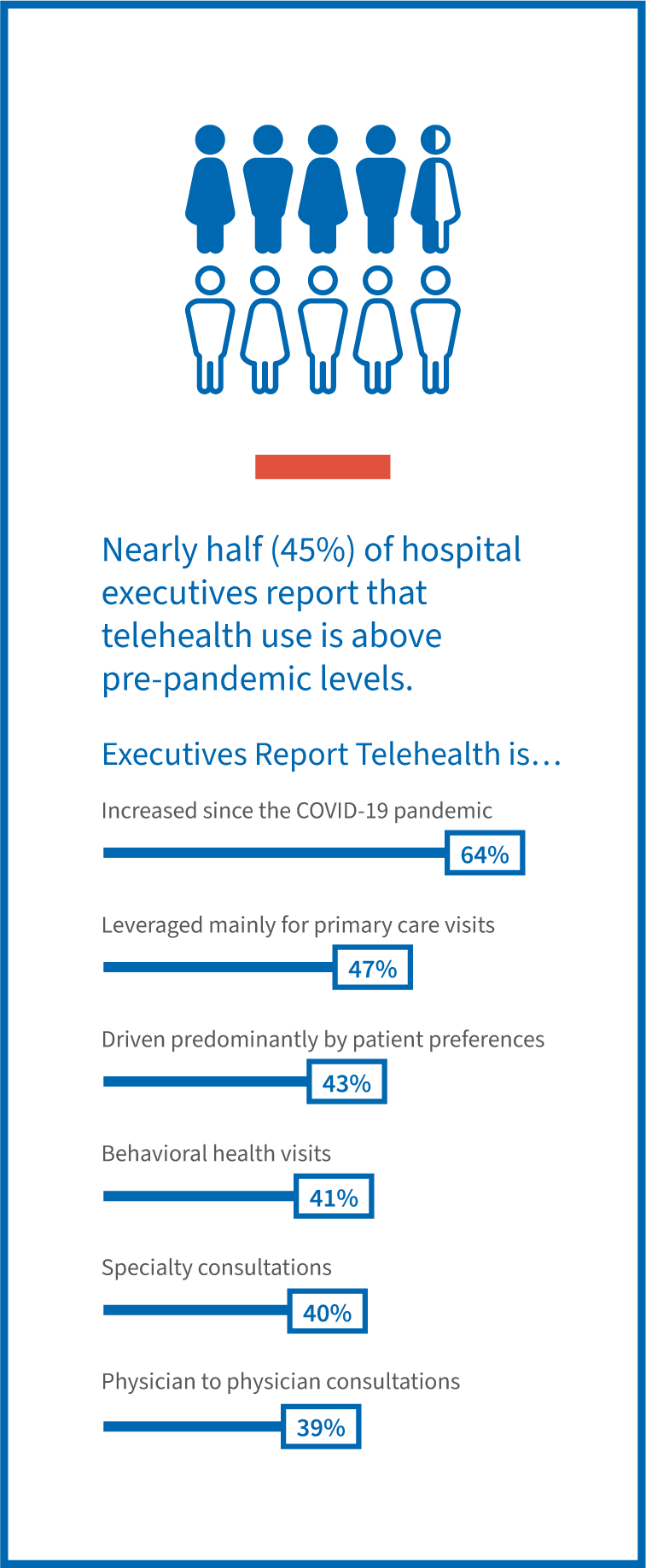U.S. Healthcare & Life Sciences Outlook 2024: Hospital Operations Survey
Hospitals in 2024:
Rising to Meet Increased Operational Demands
Table of Contents
Supporting Hospitals as they Operate Under Pressure
It’s no secret that over the past four years, U.S. hospitals and health systems have been subject to unprecedented challenges and attention. The COVID-19 pandemic ushered in heightened expectations from regulators, elected officials, communities, and patients on what care should look and feel like, causing the healthcare landscape to evolve significantly.
Hospitals face staffing shortages while there is pent up demand for high quality, convenient healthcare services. Executives are finding creative and innovative solutions to operate while meeting these challenges. The integration of telemedicine and digital health solutions has marked an exciting new way for patients to access medical services, breaking down barriers and enhancing accessibility while also creating a need for institutions to adjust rapidly.
This inaugural edition of FTI Consulting’s Healthcare and Life Sciences Hospital Operations Outlook Survey sees hospitals facing mounting pressures as executives work to manage their workforce, financial demands, and new technologies all while remaining focused on their mission to provide high quality care to their communities.
KEY CONTACTS
LAUREN CRAWFORD SHAVER
Senior Managing Director
[email protected]
REBECCA AYER PITT
Managing Director
[email protected]
We surveyed 200 hospital executives who highlighted the challenges facing their institutions including employee morale, high costs, and cybersecurity threats. They also shared how their institutions are working to overcome these challenges and what solutions they have found to be successful so far.
Nearly all hospital executives have clinical, financial, and digital and technology concerns

A deeper look at each reveals that quality of care, cybersecurity, data privacy, supply costs, recruitment and retention costs, and workforce shortages are top of mind for executives

Hospitals Navigate Unprecedented Workforce Challenges
At the core of the complex healthcare landscape lies workforce shortages – almost half (49%) of hospital executives believe their hospitals are not fully prepared to deal with current patient volumes.
Although recruiting physicians is a challenge that most executives cited, the greatest gaps exist in nursing and mental and behavioral health specialists. Salary limitations, schedules, and increasing levels of on-the-job stress are factors that contribute to workforce turnover.
Hospital executives expressed interest in building on existing retention practices and only a few executives (29%) expressed concerns over the related costs of doing so, signaling this is widely considered an important and worthwhile investment.

Head of Americas Healthcare & Life Sciences
Nearly half (49%) of hospital executives believe their hospitals are not fully prepared to deal with current patient volumes

Hospitals are already employing tools to retain talent with (69%) of executives citing retention bonuses as an effective tool for retaining staff. Other effective tools included executives hosting listening sessions with staff and hospitals investing in campaigns to strengthen workplace culture.
While more than half of hospitals report increasing their agency utilization rates, executives are actively addressing job satisfaction amongst full-time staff to avoid over reliance on this costly staffing solution. Less than one-third of executives reported having already made changes to their operating model to resolve or prevent potential workforce issues and achieve long-term sustainability, but nearly half of those who plan to make such changes (46%) say they are already in the process of implementing them with these goals in mind.

People &Transformation

Value-based Care Improves Patient Outcomes, But Few Hospitals Report Significant Cost Savings
Hospitals across the board (99%) have adopted at least one value-based care model, covering almost half of their patient populations (49%). This implementation has been driven by a renewed focus on patient-centered care (44%) and quality improvement initiatives (40%). Financial incentives (26%) and regulatory requirements (22%) also play a role but are secondary motivators, not main drivers of adoption.

While hospital leaders have seen improvements in patient outcomes (43%) and experiences (37%), less than a third of leaders report seeing substantial cost savings as a result of implementing value-based care models (29%), suggesting hospitals may need to explore other strategies to ensure fiscal stability.
Instead of turning to value-based care models to meet cost savings goals, hospitals are relying on outsourcing to meet the challenges and pressures that come from rising costs. A large majority (76%) are already outsourcing some roles or considering it, particularly for functions like supply chain management (64%), nutrition services (55%), and clinical services (55%). Just over half of hospitals (55%) are opting to outsource supply chain functions offshore (39%), likely in pursuit of greater efficiency and cost savings.

Leader of Healthcare Provider Practice
Digital Technologies Unlock Improved Patient Experience
As hospitals look to improve patient experience, telehealth increasingly is being utilized to provide convenient access to certain types of services. This shift, which over half of leaders (64%) describe as being accelerated by the COVID-19 pandemic, is here to stay and driven predominantly by patient preferences (43%).
Leaders report telehealth is leveraged most often for primary care visits (47%), behavioral health visits (41%), specialty consultations (40%), and physician to physician consultations (39%).
Hospitals are also turning to digital, centralized, technologies for patients to access and begin their care. Most hospitals (82%) are utilizing a digital front door, the collection of technologies used by healthcare providers as an entry to care, and to improve patient experience and drive patient access, lowering the average wait time for patients to receive care to under an hour. This shorter wait time is essential as patients expect quicker, more convenient points of entry. Most hospitals (76%) also report having a dedicated call center, and of those who do, most lean toward a centralized model (81%). The majority of executives report being either very satisfied (48%) or somewhat satisfied (51%) with their centralized call centers.
This stands true across the board as nearly all hospitals (89%) are either currently developing (63%) or planning to further develop (26%) their telemedicine/digital health care offerings in these areas.

Digital & Insights
Nearly half (45%) of hospital executives report that telehealth use is above pre-pandemic levels

Cybersecurity Risk Remains Top of Mind
Hospital executives are aware of the growing cybersecurity threats to the sector. Hospital leaders recognize the significant potential costs of a cybersecurity incident to their organization, with half of respondents (50%) pointing to data loss or compromise as their biggest concern. Other concerns cited include potential impacts to continuity of care (28%), financial costs (28%) and reputational risk (22%).
While hospital executives acknowledge cybersecurity risks and their potential consequences, more than half of respondents (55%) admit they are not very prepared for a cyber attack. Hospital leaders have prioritized important technical readiness measures in their organizations, with 59% of respondents noting they have conducted technical and security assessments and 50% acknowledging that they have incident response plans in place. However, most hospital executives surveyed have not invested in key preparedness programs designed to mitigate potential reputational, legal and financial risks. Less than half of hospitals surveyed have cybersecurity communications response plans (40%), cyber insurance (38%) or established relationships with outside cyber counsel (32%).
Cybersecurity risks are inevitable for hospitals that are targets due to the vast amount of personal information they necessarily have. To best prepare their organizations to mitigate risk in the event of a significant incident, hospital leaders must adopt a holistic approach to cybersecurity preparedness.

Cybersecurity & Data Privacy Communications

Final Thoughts & Takeaways
Transformations in healthcare delivery are challenging health systems to operate in new ways, under greater attention than ever before. Successfully leading a health system increasingly requires creativity, willingness to take risks, a defined vision, and the ability to inspire and engage team members at all levels. It’s crucial for hospitals to go beyond inpatient care and invest in access points and operating models that will be most utilized in the years to come. How executives tackle these opportunities and communicate about efforts to provide convenient access in lower cost settings will be critical to their success.
Positioning Organizations for Success in 2024
As this year’s FTI Consulting s’ Hospital Operations Outlook survey shows, hospitals continue to operate in an increasingly complex landscape where reputations develop and change quickly, and crises move rapidly.
The demands of regulators, elected officials, communities, and patients make it critical for hospitals to communicate clearly and persuasively to a variety of stakeholders and be prepared to protect and promote their reputations in 2024 and beyond. FTI Consulting’s experienced Healthcare and Life Sciences team understands the economic, legal, and regulatory challenges confronting hospitals and provides strategic counsel in all aspects of financial, corporate, public policy, and brand communications to best position organizations for future success.
Meet Our Team
REBECCA AYER PITT
Managing Director
+1.240.761.7426
[email protected]
LAUREN CRAWFORD SHAVER
Senior Managing Director
+1.202.870.2586
[email protected]
JAMIE SINGER
Senior Managing Director
+1.847.414.1377
[email protected]
ALEXANDRA PRIOLA
Managing Director
+1.312.553.6726
[email protected]
MICHAEL ADEYANJU
Senior Director
+1.617.747.1733
[email protected]
JAMES CONDON
Managing Director
+1.646.912.1280
[email protected]
RONELLE GREEN
Senior Research Analyst
+1.929.317.3211
[email protected]
ERIN PEZZA
Senior Director
+1.347.237.2043
[email protected]
Please contact us with questions and feedback about the survey and report. Our Healthcare & Life Sciences team looks forward to helping you develop strategies to tackle the challenges facing your organization.
Research Methodology
This research was conducted online by FTI Consulting’s Strategic Communications segment between March 27, 2024 and April 4, 2024, with 186 senior executives across all types of hospitals and 14 mid-level leaders of academic hospitals. Overall, 62 respondents represent academic hospitals, 102 are part of a health system and 36 are standalone facilities.
Related Expertise
The views expressed in this article are those of the author(s) and not necessarily the views of FTI Consulting, its management, its subsidiaries, its affiliates, or its other professionals. ©2024 FTI Consulting, Inc. All rights reserved. www.fticonsulting.com |




